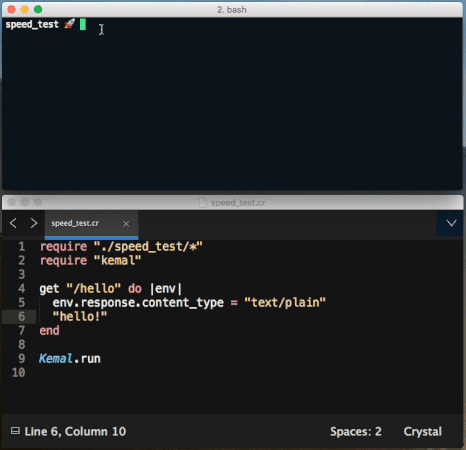Build/Runs your crystal application, watches files, and rebuilds/reruns app on file changes
To install in your project, from the root directory of your project, run:
curl -fsSLo- https://raw.githubusercontent.com/samueleaton/sentry/master/install.cr | crystal evalIf using Crystal version 0.24.2 try the following:
curl -fsSLo- https://raw.githubusercontent.com/samueleaton/sentry/crystal-v0.24.2/install.cr | crystal evalIf using Crystal version 0.23.1 or lower try the following:
curl -fsSLo- https://raw.githubusercontent.com/samueleaton/sentry/crystal-v0.23.1/install.cr | crystal evalThis will install the Sentry CLI tool. To use the Crystal API, see CRYSTAL_API.md.
Troubleshooting the install: This install script is just a convenience. If it does not work, simply: (1) place the files located in the src dir into a your project in a dev/ dir, and (2) compile sentry by doing crystal build --release dev/sentry_cli.cr -o ./sentry.
Assuming sentry.cr was correctly placed in [your project name]/dev/sentry.cr and compiled into the root of your app as sentry, simply run:
./sentry [options]./sentry --helpExample
$ ./sentry -h
Usage: ./sentry [options]
-n NAME, --name=NAME Sets the display name of the app process (default name: <your_app_here>)
--src=PATH Sets the entry path for the main crystal file (default is inferred from shards.yaml)
-b COMMAND, --build=COMMAND Overrides the default build command (will override --src flag)
--build-args=ARGS Specifies arguments for the build command
--no-build Skips the build step
-r COMMAND, --run=COMMAND Overrides the default run command
--run-args=ARGS Specifies arguments for the run command
-w FILE, --watch=FILE Overrides default files and appends to list of watched files
-c FILE, --config=FILE Specifies a file to load for automatic configuration (default: '.sentry.yml')
--install Run 'shards install' once before running Sentry build and run commands
--no-color Removes colorization from output
-i, --info Shows the values for build/run commands, build/run args, and watched files
-h, --help Show this help./sentry -b "crystal build --release ./src/my_app.cr"The default build command is crystal build ./src/[app_name].cr. The release flag is omitted by default for faster compilation time while you are developing.
./sentry -r "./my_app"The default run command is ./[app_name].
./sentry -w "./src/**/*.cr" -w "./lib/**/*.cr"The default files being watched are ["./src/**/*.cr", "./src/**/*.ecr"].
By specifying files to watch, the default will be omitted. So if you want to watch all of the file in your src directory, you will need to specify that like in the above example.
This shows the values for the build command, run command, and watched files.
./sentry -iExample
$ ./sentry -i
🤖 Sentry configuration:
display name: my_app
shard name: my_app
install shards: true
info: true
build: crystal build ./src/my_app.cr
build_args: []
run: ./my_app
run_args: []
watch: ["./src/**/*.cr", "./src/**/*.ecr"]
🤖 Your SentryBot is vigilant. beep-boop...
...
...
If you prefer granularity, you can specify arguments to the build or run commands using the --build-args or --run-args flags followed by a string of arguments.
./sentry -r "crystal" --run-args "spec --debug"This is especially usefull when initiating Sentry from a Dockerfile or package.json file. It guarantees all the shards are installed before running.
./sentry --installSentry will automatically read configurations from .sentry.yml if it exists. This can be changed with -c FILE or --config=FILE.
See the YAML.mapping definition in the Config class in the /src/sentry.cr file for valid file properties.
Sentry output is colorized by default. To remove colorization, pass the --no-color argument.
Example
./sentry --no-colorSee CRYSTAL_API.md
(1) It is tiring to have to stop and restart an app on every change.
(2) Docker!
Stop and restarting your app is especially expensive (and annoying) when running the app in a docker container, where one would need to totally rebuild the docker image for every change.
Now, for development, simply run sentry in your docker container, and it will rebuild the app from the docker container on any changes, without rebuilding the docker image/container.
- Fork it ( https://github.com/samueleaton/sentry/fork )
- Create your feature branch (git checkout -b feat-my-new-feature)
- Commit your changes (git commit -am 'Add some feature')
- Push to the branch (git push origin feat-my-new-feature)
- Create a new Pull Request
- samueleaton Sam Eaton - creator, maintainer
Sentry is intended for use in a development environment, where failure is safe and expected 😉.

